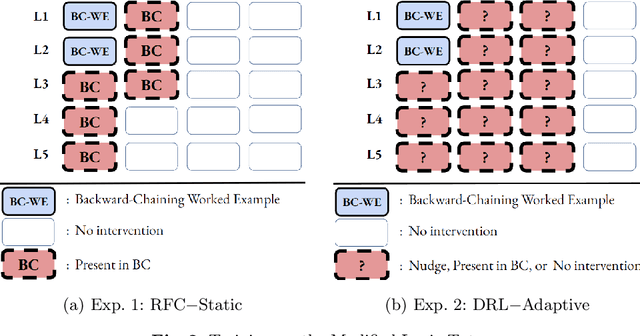John Wesley Hostetter
Bridging Declarative, Procedural, and Conditional Metacognitive Knowledge Gap Using Deep Reinforcement Learning
Apr 23, 2023



Abstract:In deductive domains, three metacognitive knowledge types in ascending order are declarative, procedural, and conditional learning. This work leverages Deep Reinforcement Learning (DRL) in providing adaptive metacognitive interventions to bridge the gap between the three knowledge types and prepare students for future learning across Intelligent Tutoring Systems (ITSs). Students received these interventions that taught how and when to use a backward-chaining (BC) strategy on a logic tutor that supports a default forward-chaining strategy. Six weeks later, we trained students on a probability tutor that only supports BC without interventions. Our results show that on both ITSs, DRL bridged the metacognitive knowledge gap between students and significantly improved their learning performance over their control peers. Furthermore, the DRL policy adapted to the metacognitive development on the logic tutor across declarative, procedural, and conditional students, causing their strategic decisions to be more autonomous.
Leveraging Deep Reinforcement Learning for Metacognitive Interventions across Intelligent Tutoring Systems
Apr 17, 2023



Abstract:This work compares two approaches to provide metacognitive interventions and their impact on preparing students for future learning across Intelligent Tutoring Systems (ITSs). In two consecutive semesters, we conducted two classroom experiments: Exp. 1 used a classic artificial intelligence approach to classify students into different metacognitive groups and provide static interventions based on their classified groups. In Exp. 2, we leveraged Deep Reinforcement Learning (DRL) to provide adaptive interventions that consider the dynamic changes in the student's metacognitive levels. In both experiments, students received these interventions that taught how and when to use a backward-chaining (BC) strategy on a logic tutor that supports a default forward-chaining strategy. Six weeks later, we trained students on a probability tutor that only supports BC without interventions. Our results show that adaptive DRL-based interventions closed the metacognitive skills gap between students. In contrast, static classifier-based interventions only benefited a subset of students who knew how to use BC in advance. Additionally, our DRL agent prepared the experimental students for future learning by significantly surpassing their control peers on both ITSs.
The Power of Nudging: Exploring Three Interventions for Metacognitive Skills Instruction across Intelligent Tutoring Systems
Mar 18, 2023



Abstract:Deductive domains are typical of many cognitive skills in that no single problem-solving strategy is always optimal for solving all problems. It was shown that students who know how and when to use each strategy (StrTime) outperformed those who know neither and stick to the default strategy (Default). In this work, students were trained on a logic tutor that supports a default forward-chaining and a backward-chaining (BC) strategy, then a probability tutor that only supports BC. We investigated three types of interventions on teaching the Default students how and when to use which strategy on the logic tutor: Example, Nudge and Presented. Meanwhile, StrTime students received no interventions. Overall, our results show that Nudge outperformed their Default peers and caught up with StrTime on both tutors.
Mixing Backward- with Forward-Chaining for Metacognitive Skill Acquisition and Transfer
Mar 18, 2023Abstract:Metacognitive skills have been commonly associated with preparation for future learning in deductive domains. Many researchers have regarded strategy- and time-awareness as two metacognitive skills that address how and when to use a problem-solving strategy, respectively. It was shown that students who are both strategy-and time-aware (StrTime) outperformed their nonStrTime peers across deductive domains. In this work, students were trained on a logic tutor that supports a default forward-chaining (FC) and a backward-chaining (BC) strategy. We investigated the impact of mixing BC with FC on teaching strategy- and time-awareness for nonStrTime students. During the logic instruction, the experimental students (Exp) were provided with two BC worked examples and some problems in BC to practice how and when to use BC. Meanwhile, their control (Ctrl) and StrTime peers received no such intervention. Six weeks later, all students went through a probability tutor that only supports BC to evaluate whether the acquired metacognitive skills are transferred from logic. Our results show that on both tutors, Exp outperformed Ctrl and caught up with StrTime.
 Add to Chrome
Add to Chrome Add to Firefox
Add to Firefox Add to Edge
Add to Edge